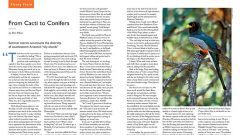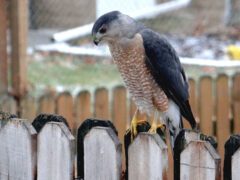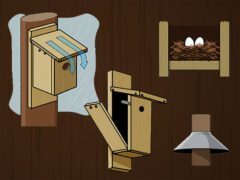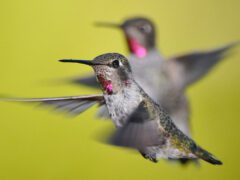The Four Keys to ID
- Size & Shape
A lanky songbird with a long, curved bill, long tail, and thick legs, recalling a mockingbird but bulkier and with a different bill.
Relative Size
Slightly larger than an American Robin, smaller than a Woodhouse’s Scrub-Jay.

 robin-sized
robin-sizedMeasurements
- Both Sexes
- Length: 10.6-11.0 in (27-28 cm)
- Weight: 2.1-3.3 oz (60.8-93.6 g)
- Wingspan: 13.4-13.6 in (34-34.5 cm)
© Tom Benson / Macaulay Library
- Color Pattern
Grayish brown above, paler off-white below mottled with indistinct gray-brown speckling. The eye is orange-yellow.
© Jeffrey Moore / Macaulay Library - Behavior
Males often perch prominently on a shrub or cactus, surveying their territory and, during the nesting season, singing during the early morning. These birds are agile and active hunters, incessantly overturning ground vegetation in search of insects, spiders, and other prey. When disturbed, they fly short distances or run through thorny habitat.
- Habitat
Deserts (especially with cholla cactus), brushlands, thorn scrub, arid canyons, pinyon-oak scrub.
© Tristan Herwood / Macaulay Library
Regional Differences
Curve-billed Thrashers from the Sonoran Desert (known as the palmeri group) have grayer chests with very indistinct spots and dull wingbars, whereas the curvirostre group of the Chihuahuan Desert has more distinct spots on a paler breast, with whitish wingbars and more white in the outer tail feathers.













